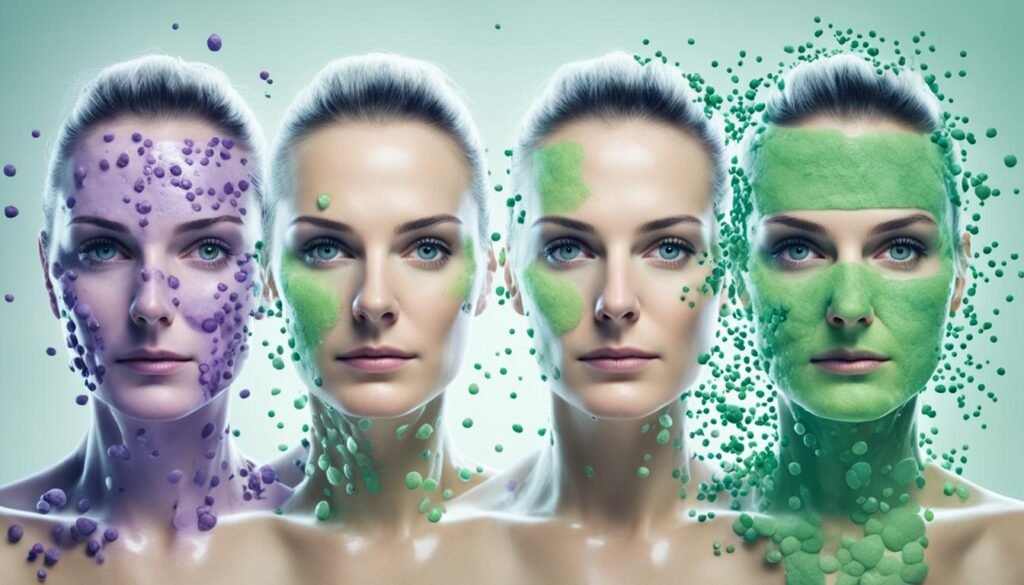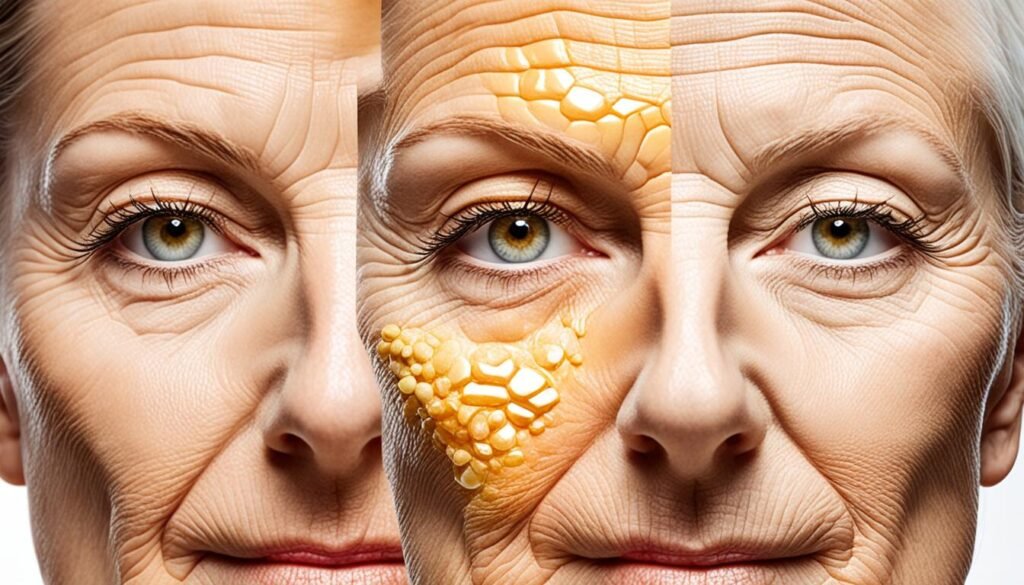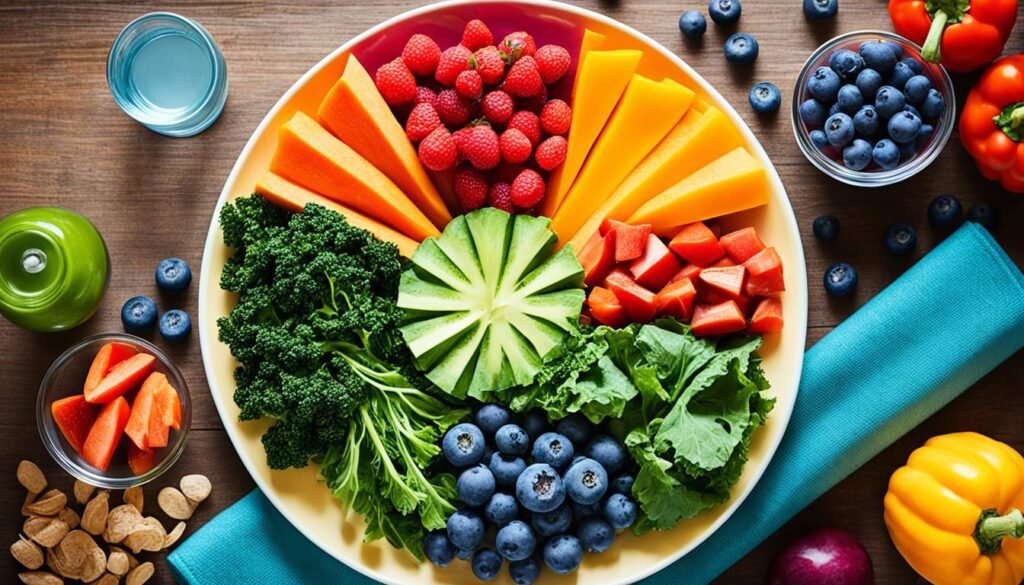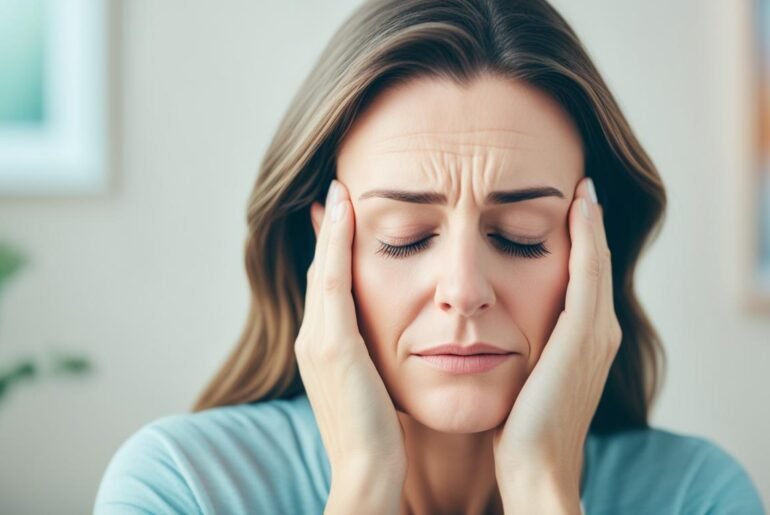Did you know that chronic stress can accelerate the aging process of your skin? It’s true. Stress has a profound impact on our skin, leading to wrinkles, sagging, and other signs of premature aging. But how exactly does stress affect our skin? Let’s dive deeper into the relationship between stress and skin aging and explore strategies to mitigate its harmful effects.
Key Takeaways:
- Chronic stress can lead to telomere shortening, thinning of the dermis, and a decrease in collagen and elastin fibers.
- Stress compromises the skin barrier, causing dryness and increased visibility of lines and wrinkles.
- Stress increases oxidative stress in the body, resulting in skin damage and premature aging.
- Stress triggers glycation, rearranging the structure of the skin and leading to loss of elasticity.
- Managing stress through various strategies can help prevent stress-related skin aging.
The Impact of Telomere Shortening on Skin Aging
Telomeres play a crucial role in maintaining the integrity of our genetic information and keeping our cells healthy. However, chronic stress can expedite the process of telomere shortening, leading to various skin aging effects.
When telomeres become shorter, the dermis, the second layer of the skin, starts to thin out. This thinning results in a decrease in collagen and elastin fibers, essential components responsible for maintaining skin elasticity and firmness.
“The shortening of telomeres due to chronic stress is considered a hallmark of aging,” says Dr. Jane Collins, a leading dermatologist.
As the collagen and elastin fibers decrease, the skin loses its ability to bounce back, resulting in sagging and the formation of wrinkles. This can give the skin a tired and aged appearance.
To better understand the impact of telomere shortening on skin aging, consider the following information:
| Effects of Telomere Shortening on Skin Aging | Consequences |
|---|---|
| Thinning of the dermis | Increased skin sagging |
| Decreased collagen and elastin | Elevated appearance of wrinkles |
As seen in the table, telomere shortening directly contributes to skin sagging and wrinkling, ultimately affecting the overall youthful appearance of the skin.
Therefore, managing stress levels becomes crucial to minimize the shortening of telomeres and promote the health and integrity of the skin.
By implementing stress management techniques such as regular exercise, meditation, and engaging in hobbies, individuals can help slow down the telomere shortening process and maintain healthier and more youthful-looking skin for longer.
Moreover, following a comprehensive skincare routine that focuses on collagen-boosting ingredients and adopting a healthy lifestyle can also have a positive impact on telomere length and skin health.
The Role of the Skin Barrier in Stress-Induced Skin Aging

The skin barrier is a crucial component of our skin’s defense system. It acts as a protective shield, guarding against harmful substances, toxins, and allergens. Additionally, it plays a vital role in maintaining the skin’s hydration levels. However, chronic stress can disrupt the functioning of the skin barrier, leading to various skin issues, including dryness, lines, and wrinkles.
When stress levels are high, the skin’s barrier function is compromised. This compromises the skin’s ability to retain moisture, causing it to become dry and dehydrated. Dry skin not only feels uncomfortable but also leads to the appearance of fine lines and wrinkles. Without an intact skin barrier, the skin is more susceptible to damage from external aggressors, accelerating the aging process.
One way stress affects the skin barrier is by impairing the production of natural moisturizing factors (NMFs). NMFs are essential substances that help maintain the skin’s hydration by preventing water loss. When stress disrupts their production, the skin becomes more susceptible to dryness, leading to a compromised barrier function.
Furthermore, chronic stress can lead to increased inflammation in the skin. Inflammation disrupts the normal functioning of the skin barrier, making it less effective in protecting against environmental stressors. This can further contribute to the development of skin concerns such as dryness, redness, and irritation.
Managing stress is imperative to support the health and functionality of the skin barrier. Incorporating stress-relieving activities into your daily routine, such as meditation, exercise, and engaging in hobbies, can help reduce stress levels and minimize its impact on the skin. Additionally, adopting a skincare routine that focuses on hydrating and nourishing the skin can help strengthen the skin barrier, improving its ability to retain moisture and protect against external aggressors.
| Effects of Stress on the Skin Barrier | How it Affects the Skin |
|---|---|
| Disruption of natural moisturizing factor (NMF) production | Dryness and increased water loss from the skin |
| Inflammation | Impaired barrier function and increased vulnerability to environmental stressors |
| Weakened lipid barrier | Reduced ability to retain moisture and protect against toxins |
The Role of Oxidative Stress in Stress-Induced Skin Aging
Oxidative stress plays a significant role in stress-induced skin aging. It occurs when there is an imbalance between free radicals and antioxidants in the body. Free radicals, which are toxic byproducts generated during metabolism, can cause damage to cells, including the skin, if not neutralized by antioxidants.
Chronic stress, along with other factors like exposure to toxins, UV radiation, smoking, poor nutrition, and excessive alcohol use, can contribute to oxidative stress. This oxidative stress leads to the production of more free radicals, resulting in cellular damage, inflammation, and accelerated skin aging.
Oxidative stress can manifest on the skin in various ways. One common effect is the formation of pigmented spots, also known as age spots or sunspots. These spots are caused by the overproduction of melanin, which is the pigment responsible for skin color. Additionally, oxidative stress can contribute to the breakdown of collagen and elastin, proteins that provide strength and elasticity to the skin. This breakdown leads to the formation of wrinkles, fine lines, and skin sagging.
To combat oxidative stress and its effects on the skin, it is crucial to manage stress and adopt a healthy lifestyle. Here are some strategies:
- Stress management: Engaging in stress-reducing activities such as meditation, yoga, or spending time in nature can help lower cortisol levels and mitigate oxidative stress.
- Antioxidant-rich diet: Consuming a diet rich in antioxidants from fruits, vegetables, nuts, and seeds can help counteract the effects of free radicals and reduce oxidative stress on the skin.
- Hydration: Staying hydrated by drinking an adequate amount of water daily can support the body’s natural detoxification processes, reducing oxidative stress.
- Sun protection: Limiting exposure to UV rays by wearing sunscreen with a high SPF, protective clothing, and avoiding excessive sun exposure can prevent additional oxidative stress caused by sun damage.
- Quit smoking: Smoking is a significant source of free radicals and can contribute to oxidative stress. Quitting smoking can benefit overall health and improve the condition of the skin.
- Moderate alcohol consumption: Excessive alcohol intake can deplete antioxidants in the body and worsen oxidative stress. Limiting alcohol consumption can help maintain skin health.
By implementing these strategies, individuals can reduce oxidative stress, protect their skin from premature aging, and maintain a youthful and radiant complexion.
The Role of Glycation in Stress-Induced Skin Aging

Glycation is a process that occurs when sugar molecules in the blood bond with proteins, leading to the formation of advanced glycation end products (AGEs). Elevated levels of AGEs have been associated with skin aging, as they gradually rearrange the structure of the skin, causing it to lose elasticity. This process is particularly relevant in stress-induced skin aging, as chronic stress triggers the release of cortisol, a hormone that increases sugar release into the bloodstream.
Glycation has detrimental effects on the skin, contributing to the formation of wrinkles, fine lines, and loss of firmness. It compromises the structural components of the skin such as collagen and elastin, leading to reduced skin elasticity and resilience. Additionally, glycation can contribute to other signs of aging, including hyperpigmentation and a dull complexion.
Managing stress is crucial in preventing and reducing glycation-induced skin aging. By implementing stress management techniques such as exercise, meditation, and engaging in activities that promote relaxation, individuals can help regulate cortisol levels and minimize the release of sugar into the bloodstream. Additionally, limiting sugar intake in the diet can further reduce glycation and its negative effects on the skin.
Elevated levels of AGEs have been associated with skin aging, as they gradually rearrange the structure of the skin, causing it to lose elasticity.
Effects of Glycation on the Skin:
- Loss of skin elasticity
- Formation of wrinkles and fine lines
- Reduced collagen and elastin production
- Hyperpigmentation
- Dullness
By addressing the underlying causes of glycation, individuals can prevent or minimize its impact on the skin. Limiting sugar intake, managing stress, and practicing a healthy lifestyle are essential in maintaining a youthful and healthy complexion.
Strategies to Control Stress-Related Skin Aging
There are several steps individuals can take to manage stress and minimize its impact on skin aging.
- Manage stress: Engaging in activities like hobbies, meditation, and exercise can help reduce cortisol levels and promote overall well-being. Taking time to relax and unwind regularly is crucial for managing stress effectively.
- Follow a skin-friendly diet: Incorporating a diet rich in antioxidants from fruits and vegetables is important for supporting skin health. Antioxidants help combat oxidative stress and protect the skin from damage. Including foods like berries, leafy greens, and nuts in your diet can provide the necessary nutrients for healthy skin.
- Limit sugar intake: High sugar consumption can contribute to glycation, a process that rearranges the structure of the skin and leads to loss of elasticity. Avoiding foods and drinks with added sugars and opting for natural alternatives like honey or stevia can help prevent glycation and maintain skin elasticity.
- Ensure sun protection: Protecting the skin from harmful UV rays is crucial for preventing photoaging caused by sun exposure. Consistently applying broad-spectrum sunscreen with an SPF of 30 or higher, wearing hats, sunglasses, and sun-protective clothing can provide effective sun protection.
By incorporating these strategies into your daily routine, you can effectively manage stress and support healthy, youthful-looking skin. It’s also beneficial to consult with a primary care physician who can provide personalized guidance and support for stress management.
The Importance of Exercise in Stress Reduction and Anti-Aging

Regular exercise is not only beneficial for overall health but also plays a significant role in stress reduction and anti-aging. Exercise has been shown to reduce cortisol levels, improve mood, and enhance overall well-being. By incorporating exercise into your daily routine, you can effectively manage stress and promote a more youthful appearance.
Reducing Stress with Exercise
Exercise is a powerful stress reducer. When you engage in physical activity, your body releases endorphins, also known as “feel-good” hormones, which help alleviate stress and improve your mood. Whether you choose to go for a jog, take a dance class, or do yoga, finding an exercise that you enjoy can provide a much-needed break from the daily pressures of life and help you feel more calm and relaxed.
Enhancing Circulation for a Youthful Appearance
Exercise improves blood circulation throughout the body, including the skin. When blood flow to the skin is increased, it delivers essential nutrients and oxygen, promoting a healthier complexion and a youthful appearance. Regular exercise can also help flush out toxins and waste products from the body, further contributing to a clearer and more radiant complexion.
Choosing the Right Exercise
When it comes to stress reduction and anti-aging, it’s important to choose exercises that you enjoy and can incorporate into your routine consistently. Whether it’s going for a brisk walk, swimming, cycling, or joining a fitness class, find activities that bring you joy and make you feel good. Aim for at least 150 minutes of moderate-intensity exercise or 75 minutes of vigorous-intensity exercise per week to experience the benefits.
“Exercise is a powerful tool in managing stress and promoting a youthful appearance. Find activities that you enjoy and make them a regular part of your routine.”
The Significance of a Skin-Friendly Diet in Stress Reduction and Anti-Aging

Adopting a skin-friendly diet is crucial for stress reduction and anti-aging. By incorporating a variety of fruits and vegetables, you can provide your body with essential antioxidants that combat oxidative stress and protect the skin from damage and premature aging.
Antioxidants play a key role in maintaining skin health by neutralizing harmful free radicals that can accelerate the aging process. They help to maintain collagen and elastin, two essential proteins that keep the skin firm and elastic.
Additionally, limiting sugar intake is essential for stress reduction and to prevent glycation, a process that can affect the skin’s elasticity. Excess sugar in the diet can lead to the formation of advanced glycation end products (AGEs), which can cause the skin to lose its youthful appearance.
By adopting a skin-friendly diet and reducing sugar consumption, you can help maintain the skin’s elasticity and promote a more youthful appearance.
A skin-friendly diet should include a variety of nutrient-dense foods such as:
| Fruits | Vegetables |
|---|---|
| Blueberries | Spinach |
| Strawberries | Kale |
| Oranges | Carrots |
These foods are rich in antioxidants, vitamins, and minerals that support overall skin health and provide protection against oxidative stress.
Incorporating a skin-friendly diet into your daily routine, alongside stress management techniques, can significantly contribute to overall well-being and promote healthier, more youthful-looking skin.
The Impact of Smoking and Alcohol on Stress-Induced Skin Aging
Smoking and excessive alcohol consumption can have a detrimental effect on stress-induced skin aging. Both smoking and alcohol contribute to dehydration, which can lead to dry and dull skin, making fine lines and wrinkles more prominent. Smoking, in particular, accelerates the aging process by damaging the skin’s collagen and elastin fibers. As a result, premature wrinkles and sagging may occur.
Excessive alcohol intake also constricts the blood vessels, reducing blood flow to the skin. This decreased circulation limits oxygen and nutrient supply to the skin, impairing its ability to regenerate and maintain elasticity. Furthermore, alcohol can dehydrate the body, leading to an overall tired and aged appearance.
To combat the negative effects of smoking and alcohol on stress-induced skin aging, it is crucial to quit smoking and limit alcohol consumption. By quitting smoking, the skin’s natural rejuvenation processes can gradually improve, leading to a reduction in visible wrinkles and sagging. Limiting alcohol intake not only helps preserve the skin’s hydration but also supports overall health and well-being.
In addition to quitting smoking and reducing alcohol consumption, incorporating a skincare routine with hydrating and nourishing products can help combat the effects of stress-induced aging. Moisturizers, serums, and face masks rich in antioxidants can help replenish moisture and protect against damage caused by smoking and alcohol.
It is important to remember that stress, smoking, and excessive alcohol consumption are interconnected factors that can accelerate the aging process. By addressing these lifestyle choices and adopting healthier habits, individuals can promote skin health and maintain a youthful appearance.
The Role of UV Protection in Preventing Stress-Induced Skin Aging

UV radiation from the sun is a significant contributor to skin aging. Chronic exposure to UV rays can lead to photodamage, including wrinkles, age spots, and loss of skin elasticity. Stress-induced skin aging can be further exacerbated by UV radiation. Protecting the skin from UV rays through the consistent use of broad-spectrum sunscreen with an SPF of 30 or higher, wearing hats, sunglasses, and sun-protective clothing can help prevent photoaging and maintain a youthful appearance. Daily sun protection is crucial, regardless of stress levels.
The Importance of UV Protection
UV rays are a form of electromagnetic radiation emitted by the sun, consisting of UVA, UVB, and UVC rays. UVA rays penetrate deep into the skin, causing long-term damage and contributing to premature aging. UVB rays primarily affect the outer layers of the skin and are responsible for sunburns. UVC rays are absorbed by the Earth’s atmosphere and do not reach the skin.
Exposure to UV rays can lead to various skin issues, including:
- Wrinkles and fine lines
- Age spots and pigmentation
- Loss of skin elasticity
- Skin cancer
The Role of SPF in Sun Protection
SPF (Sun Protection Factor) is a measure of how effectively a sunscreen protects the skin from UVB rays. It indicates the amount of time it takes for UVB rays to cause sunburn compared to unprotected skin. For example, if it takes 10 minutes for unprotected skin to burn, an SPF 30 sunscreen will provide 30 times longer protection, or approximately 300 minutes.
However, it’s important to note that SPF does not provide complete protection from UVA rays. That’s why it’s crucial to choose a broad-spectrum sunscreen that protects against both UVA and UVB rays.
Practicing Sun Protection
To effectively protect your skin from UV rays and prevent stress-induced skin aging, consider the following:
- Apply sunscreen generously to all exposed skin, including the face, neck, arms, and legs.
- Reapply sunscreen every two hours, or more frequently if you’re swimming or sweating.
- Wear protective clothing, such as long sleeves, pants, and wide-brimmed hats.
- Use sunglasses that provide 100% UV protection to shield your eyes and the delicate skin around them.
- Seek shade during the sun’s peak hours, typically between 10 a.m. and 4 p.m.
By incorporating these sun protection practices into your daily routine, you can minimize the detrimental effects of UV radiation and maintain a healthier, more youthful-looking complexion, regardless of stress levels.
Conclusion
In conclusion, chronic stress has a significant impact on the premature aging of the skin. Telomere shortening, compromised skin barrier, increased oxidative stress, and glycation are all consequences of stress that contribute to skin aging. However, by prioritizing stress management and adopting healthy lifestyle habits, individuals can mitigate these effects and promote healthier, more youthful-looking skin.
Effective stress management strategies include incorporating regular exercise into daily routines and following a skin-friendly diet rich in antioxidants. Limiting sugar intake and practicing sun protection, such as using broad-spectrum sunscreen with SPF 30 or higher, wearing hats and sunglasses, and using sun-protective clothing, also play crucial roles in preventing stress-induced skin aging.
Investing in stress management not only benefits the skin but also contributes to overall well-being. By taking proactive measures to reduce stress levels, individuals can improve their quality of life while maintaining the health and vitality of their skin. Prioritizing stress management is the key to preventing stress-related skin aging and achieving long-lasting skin health.
FAQ
How does stress contribute to skin aging?
Chronic stress can lead to telomere shortening, compromise the skin barrier, increase oxidative stress, and trigger glycation, all of which contribute to premature skin aging.
What is the role of telomere shortening in skin aging?
Telomere shortening can result in a thinning of the dermis, a decrease in collagen and elastin, and lead to skin sagging and wrinkling.
How does stress impact the skin barrier?
Stress can compromise the skin barrier, causing dryness and increased visibility of lines and wrinkles.
What is the role of oxidative stress in stress-induced skin aging?
Oxidative stress can cause damage to the skin, resulting in pigmented spots, wrinkles, and skin sagging.
How does stress contribute to glycation and skin aging?
Stress can increase the release of sugar into the bloodstream, leading to glycation, which rearranges the structure of the skin and contributes to loss of elasticity.
Managing stress through activities like hobbies, meditation, and exercise, adopting a skin-friendly diet, limiting sugar intake, and practicing sun protection can help mitigate the negative effects of stress on the skin.
How does exercise contribute to stress reduction and anti-aging?
Exercise reduces cortisol levels, improves mood, enhances overall well-being, and promotes healthy, youthful-looking skin through improved circulation.
How does a skin-friendly diet help reduce stress and prevent skin aging?
A diet rich in antioxidants from fruits and vegetables helps combat oxidative stress, protects the skin from damage, and maintaining skin elasticity by limiting sugar intake.
How does smoking and alcohol consumption impact stress-induced skin aging?
Smoking damages collagen and elastin, leading to premature wrinkles and sagging, while excessive alcohol use dehydrates the body and makes fine lines and wrinkles more visible.
Why is UV protection important in preventing stress-induced skin aging?
Chronic exposure to UV rays can contribute to photodamage, including wrinkles, age spots, and loss of skin elasticity. Consistent sun protection helps prevent these signs of aging.
What is the impact of stress management on skin aging?
Effectively managing stress through various strategies can help mitigate the negative effects of stress on the skin, promoting healthier, more youthful-looking skin.




